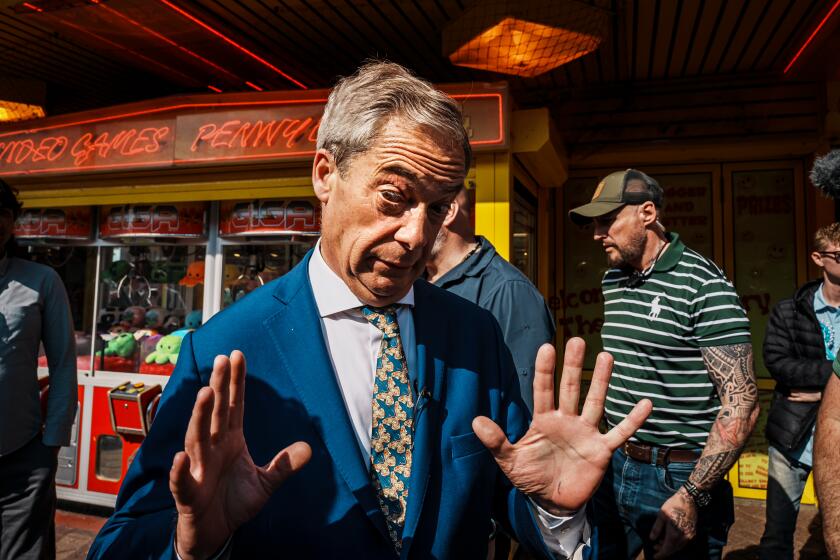Labor Party on track for a big win in U.K. election, exit poll suggests

- Share via
LONDON — Britain’s Labor Party headed for a landslide victory in a parliamentary election Thursday, an exit poll suggested, as voters punished the governing Conservatives after 14 years of economic and political upheaval.
The poll released moments after voting closed in the parliamentary election indicated that the center-left Labor leader Keir Starmer will be the country’s next prime minister. He will face a jaded electorate impatient for change against a gloomy backdrop of economic malaise, mounting distrust in institutions and a fraying social fabric.
The historic defeat for the Conservatives leaves the party depleted and in disarray and will probably spark a contest to replace Prime Minister Rishi Sunak as its leader.
“Nothing has gone well in the last 14 years,” said London voter James Erskine, who was optimistic for change. “I just see this as the potential for a seismic shift, and that’s what I’m hoping for.”
Although the suggested result appears to buck recent rightward electoral shifts in Europe, including in France and Italy, many of those same populist undercurrents flow in Britain. Reform U.K. leader Nigel Farage has roiled the race with his party’s anti-immigrant “take our country back” sentiment and undercut support for the Conservatives, who already faced dismal prospects.
Trump acolyte Nigel Farage, polarizing leader of a far-right party, is running for British Parliament. Could he lead a MAGA-like takeover of Conservatives?
Labor is on course to win about 410 seats in the 650-seat House of Commons and the Conservatives 131, according to the exit poll. That would be the fewest number of seats for the Tories in their nearly two-century history.
Former Conservative leader William Hague said the poll indicated “a catastrophic result in historic terms for the Conservative Party.”
Still, Labor politicians, inured to years of disappointment, were cautious, with full results still hours off.
“The exit poll is encouraging, but obviously we don’t have any of the results yet,” deputy leader Angela Rayner told Sky News.
In a sign of the volatile public mood and anger at the system, some smaller parties appeared to have done well, including the centrist Liberal Democrats and Farage’s far-right Reform U.K.
The poll, conducted by the firm Ipsos, asks people at scores of polling stations to fill out a replica ballot showing how they have voted. It usually provides a reliable though not exact projection of the final result.
The election’s expected booting out of Britain’s Conservative party would end 14 years of rule. Economic discontent and immigration top voter concerns.
Britain has experienced a run of turbulent years — some of it of the Conservatives’ own making and some of it not — that has left many voters pessimistic about their country’s future. The U.K.’s exit from the European Union followed by the COVID-19 pandemic and Russia’s invasion of Ukraine battered the economy, while lockdown-breaching parties held by then-Prime Minister Boris Johnson and his staff caused widespread anger.
Johnson’s successor, Liz Truss, rocked the economy further by proposing a package of drastic tax cuts and lasted just 49 days in office. Rising poverty and cuts to state services have led to gripes about “Broken Britain.”
Hundreds of communities were locked in tight contests in which traditional party loyalties come second to more immediate concerns about the economy, crumbling infrastructure and the National Health Service.
In Henley-on-Thames, about 40 miles west of London, voters such as retiree Patricia Mulcahy sensed the nation was looking for something different. The community, which normally votes Conservative, may change its stripes this time.
“The younger generation are far more interested in change,’’ Mulcahy said. “So, I think whatever happens in Henley, in the country, there will be a big shift. But whoever gets in, they’ve got a heck of a job ahead of them. It’s not going to be easy.”
In the first hour polls were open, Sunak made the short journey from his home to vote at Kirby Sigston Village Hall in his Richmond constituency in northern England. He arrived with his wife, Akshata Murty, and they walked hand in hand into the village hall, which is surrounded by rolling fields.
The Labor Party had a steady and significant lead in opinion polls for months, but its leaders warned against taking the election result for granted, worried their supporters will stay home.
Ukrainians displaced by war find new purpose in Shakespeare’s play of love, loss and madness, bringing their blood-red version to the bard’s hometown.
“Change. Today, you can vote for it,” Starmer wrote Thursday on the social media platform X.
A couple of hours after posting that message, Starmer walked with his wife, Victoria, to a polling place in the Kentish Town section of London to cast his vote. He left through a back door out of sight of a crowd of residents and journalists.
Labor did not exactly set pulses racing with its pledges to get the sluggish economy growing, invest in infrastructure and make Britain a “clean energy superpower.”
But nothing had really gone wrong in its campaign either. The party won the support of large chunks of the business community and endorsements from traditionally conservative newspapers, including the Rupert Murdoch-owned Sun tabloid, which praised Starmer for “dragging his party back to the center ground of British politics.”
Former Labor candidate Douglas Beattie, author of the book “How Labor Wins: (And Why it Loses),” said Starmer’s “quiet stability probably chimes with the mood of the country right now.”
The Conservatives, meanwhile, were beset by gaffes. The campaign got off to an inauspicious start when rain drenched Sunak as he made the announcement outside 10 Downing St., the office and residence of British prime ministers. Then, Sunak brought scorn when he went home early from commemorations in France marking the 80th anniversary of the D-day invasion.
Several Conservatives close to Sunak are being investigated over suspicions they used inside information to place bets on the date of the election before it was announced.
Sunak struggled to shake off the taint of political chaos and mismanagement that’s gathered around the Conservatives.
But for many voters, the lack of trust applies not just to the governing party, but also to politicians in general.
“I don’t know who’s for me as a working person,” said Michelle Bird, a port worker in Southampton on England’s south coast who was undecided about whether to vote Labor or Conservative. “I don’t know whether it’s the devil you know or the devil you don’t.”
Melley and Lawless write for the Associated Press.
More to Read
Sign up for Essential California
The most important California stories and recommendations in your inbox every morning.
You may occasionally receive promotional content from the Los Angeles Times.













